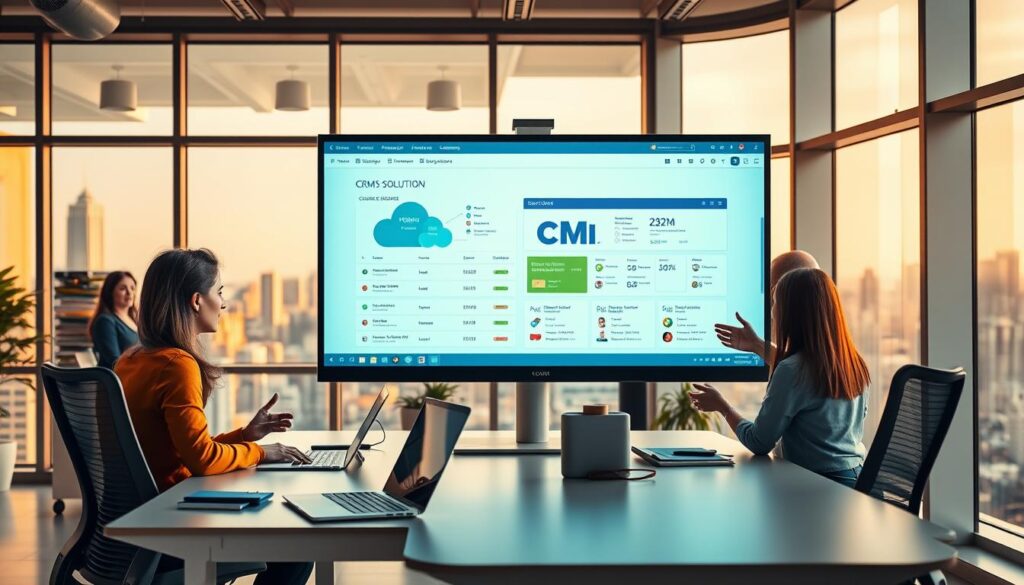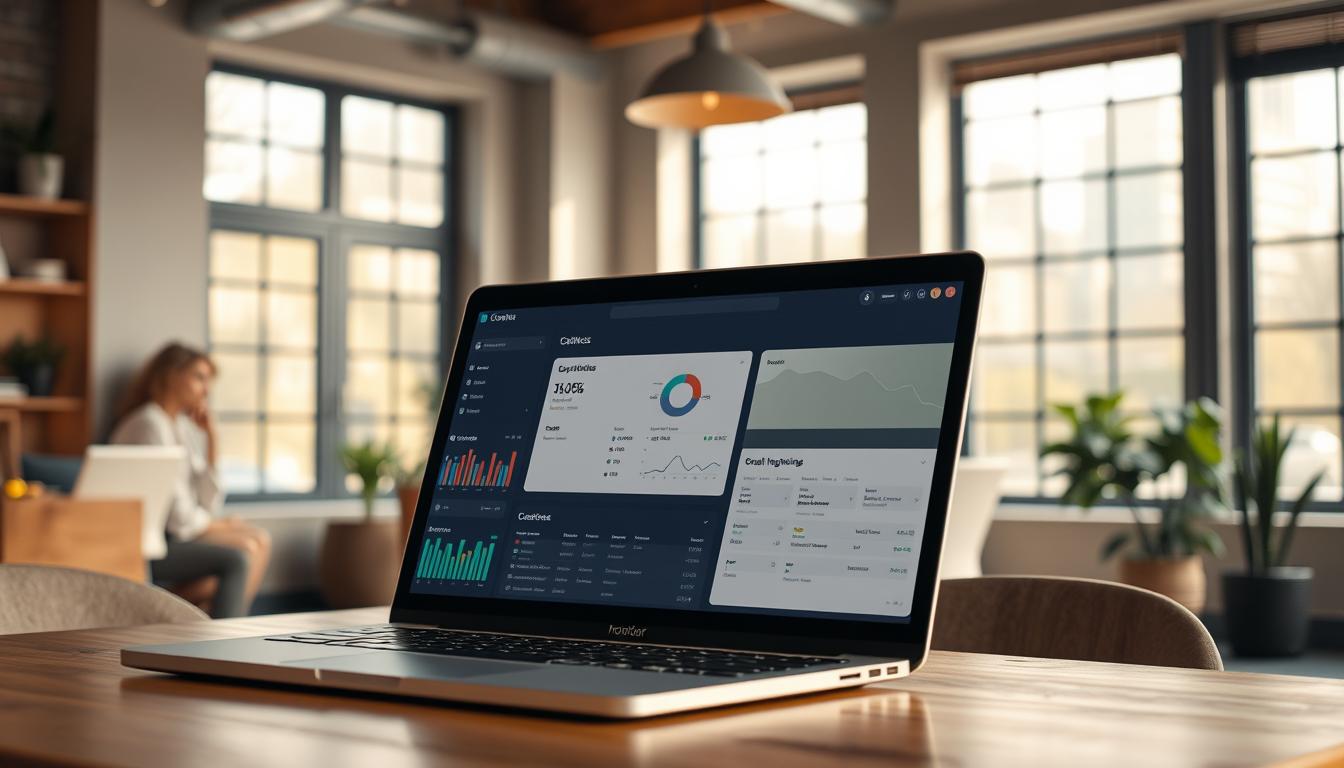In today’s competitive market, building strong customer relationships is key for growth and sales. Paul Wnek says, “A CRM solution helps business owners use customer data to better customer relations and hit new sales heights.”
Using CRM software can make operations smoother, enhance customer service, and boost sales. This is vital for small businesses looking to improve customer interactions and grow.
Key Takeaways
- CRM solutions help harness customer data to improve customer relations.
- Effective CRM is crucial for small businesses to drive growth.
- CRM software streamlines operations and improves customer service.
- Leveraging CRM helps businesses reach new sales heights.
- Improving customer interactions is key to driving sales.
What is Customer Relationship Management Software?
CRM software helps businesses manage their sales, marketing, and customer service. It lets them see their customers better. This way, they can offer more personalized experiences.
Definition and Key Features
CRM software is all about managing customer interactions. It has key features like:
- Contact Management: Keeping track of customer and potential customer info.
- Sales Tracking: Watching sales to find chances and problems.
- Marketing Automation: Making marketing campaigns better and more personal.
- Customer Service Tools: Helping customers through different ways.
These features help businesses run smoother, make customers happier, and grow sales.
| Feature | Description | Benefit |
|---|---|---|
| Contact Management | Centralized database for customer information | Improved customer insights |
| Sales Tracking | Monitoring sales interactions and performance | Enhanced sales forecasting |
| Marketing Automation | Automating marketing campaigns | Increased efficiency and personalization |
Importance for Small Businesses
For small businesses, CRM software is key. It lets them compete with big companies by managing customer relationships well. The best CRM software for small businesses helps them:
“CRM software helps businesses store and manage contact information for customers, track leads, find sales opportunities, manage marketing campaigns, handle customer service efforts, and more — all in a single dashboard.”
By using CRM software, small businesses can better their customer relationships, work more efficiently, and grow their business.
Benefits of Using CRM Software for Small Businesses
CRM software brings many benefits to small businesses. It helps improve customer relationships and makes operations more efficient. With affordable CRM solutions, small businesses can change how they handle customer interactions and internal processes.
Enhanced Customer Relationships
CRM software is great for improving customer relationships. It keeps customer details and contact info in one place. This helps teams stay organized and avoid missing tasks.
It also lets businesses offer more personalized service. This leads to happier customers and more loyalty.
CRM software also tracks customer interactions across different channels. This gives a full view of what customers like and do. Businesses can then tailor their marketing and customer communications to build stronger relationships.
Improved Efficiency and Productivity
CRM software also boosts efficiency and productivity in small businesses. It automates routine tasks and keeps customer data in one place. This makes operations smoother and cuts down on paperwork.
With more time, businesses can focus on important tasks like marketing and finding new sales. Top rated CRM tools also offer analytics and reports. These help businesses understand their performance and make better decisions.
How to Choose the Right CRM Solution
Finding the right CRM can change how you interact with customers. But, picking the right one is key. First, understand what your business needs. Then, look at different CRM options to see which fits your needs best.
Assessing Your Business Needs
Before exploring CRM software, know what your business needs. List your current systems and programs. This shows where a CRM could help.
Think about your budget and how much you might grow. Set clear goals for your CRM. Do you want better customer service, more sales, or easier marketing?
To figure out what you need, ask yourself:
- What are our main goals for a CRM?
- How many people will use the CRM?
- What features are must-haves for our business?
Top Features to Consider
After knowing what you need, compare CRM features. Look for easy-to-use customer relationship management software with:
| Feature | Description | Importance Level |
|---|---|---|
| Contact Management | Ability to store and manage customer information | High |
| Sales Automation | Streamlines sales processes and tracks opportunities | Medium |
| Marketing Automation | Automates marketing campaigns and tracks engagement | Medium |
| Customer Service Tools | Provides support and tracks customer issues | High |
| Reporting and Analytics | Offers insights into customer behavior and sales performance | High |
When looking at small business CRM platforms, think about how easy it is to use. Good customer support is also key. A user-friendly CRM helps your team use it more.
By carefully looking at your needs and comparing CRM features, you can choose wisely. This choice will help your business and customer relationships grow.
Popular Small Business CRM Software Options
The market has many CRM solutions for small businesses. Each has its own features and benefits. It’s key to pick a CRM that meets your business’s specific needs.
Salesforce Essentials
Salesforce Essentials is a top pick for small businesses. It has tools for managing sales, customer service, and marketing. It helps businesses stay organized and focused on growth.
HubSpot CRM
HubSpot CRM is well-liked for its easy-to-use interface. It integrates well with other HubSpot tools. It offers contact management, sales pipeline tracking, and meeting scheduling.
Zoho CRM
Zoho CRM is versatile and packed with features for small businesses. It includes lead management, sales forecasting, and marketing automation. It helps businesses streamline operations and engage with customers better.
Let’s look at the main features of these CRMs:
| CRM Software | Key Features | Pricing |
|---|---|---|
| Salesforce Essentials | Contact Management, Sales Tracking, Customer Service | $25/user/month |
| HubSpot CRM | Contact Management, Sales Pipeline Tracking, Meeting Scheduling | Free |
| Zoho CRM | Lead Management, Sales Forecasting, Marketing Automation | $12/user/month |
The table shows each CRM’s strengths and prices. Small businesses can choose the best CRM for their needs based on these factors.

Integrating CRM with Other Business Tools
Exploring further, integrating CRM with other tools can make your business run smoother. By linking your CRM with other apps, you can automate tasks and improve how you interact with customers. This makes your business more efficient.
To get the most out of your CRM, integrating it with other tools is key. This connection helps automate marketing, track customer interactions, and manage sales better. For example, linking CRM with marketing tools lets you personalize your marketing and boost customer engagement.
Marketing Automation
Marketing automation is a strong tool that works well with CRM. It automates marketing tasks, saving you time and resources. This makes your marketing campaigns more effective. For more on CRM integration, check out CRM Integration.
Some main benefits of CRM and marketing automation integration include:
- Automated lead scoring and nurturing
- Personalized marketing campaigns
- Improved customer engagement
E-commerce Platforms
CRM and e-commerce platform integration also boosts business operations. This link helps manage customer data and sales better, offering a smooth experience online and offline.
By linking your CRM with an e-commerce platform, you can:
- Synchronize customer data and sales information
- Enhance customer service through personalized interactions
- Improve sales forecasting and inventory management
In conclusion, integrating CRM with tools like marketing automation and e-commerce platforms enhances its use. This integration improves customer interactions, automates tasks, and drives growth for businesses.
Customization and Scalability in CRM Systems
Effective CRM solutions need to change with our business and customer needs. As we grow, our CRM systems must scale and customize to meet new challenges and opportunities.
Adapting to Business Growth
CRM systems are made to grow with our business. This is key for affordable CRM solutions that can adapt as we do. When looking at CRM software, it’s important to see if it can change with our business needs.
Look for features like adding new users, features, and integrations as needed. A scalable CRM system lets us grow our customer base and explore new markets. It also helps us improve our sales strategies without being held back by our CRM software.
| Scalability Features | Benefits for Small Businesses |
|---|---|
| Customizable dashboards | Enhanced user experience and productivity |
| Integration with other business tools | Streamlined workflows and improved efficiency |
| Scalable data storage | Ability to handle growing customer data without additional costs |
Personalizing Customer Interactions
Personalization is key for CRM software features for small businesses. By using customer data, we can make our interactions more personal. This makes customers happier and more loyal.
To personalize, we need CRM software that can analyze customer data and give us insights. Our CRM should track customer interactions across different channels. This lets us send targeted marketing and offer personalized customer service.
For more info on using CRM solutions for your business, check out our offerings page. We have services and solutions to help your business grow.

Best Practices for Implementing CRM Software
Effective CRM implementation needs strategic planning, team training, and ongoing care. To get the most from top rated CRM tools, businesses must take a detailed approach. This approach should meet the needs of the organization.
When starting with easy-to-use customer relationship management software, know your business goals first. Understand how the CRM will help reach those goals. Look at your current processes and see where the CRM can improve things.
Training Your Team
Getting your team to use CRM well is key. This means training them well and supporting them as they use the system.
- Give detailed training on all CRM features.
- Make sure training fits the needs of each team member.
- Provide ongoing help and resources for any issues.
CRM experts say, “Good training is essential for CRM success.”
“The biggest challenge is not the technology itself, but getting people to use it effectively.” –
Regular Updates and Maintenance
To keep your CRM working well, regular updates and care are vital.
| Maintenance Task | Frequency | Benefits |
|---|---|---|
| Software Updates | As needed | Ensures you have the latest features and security patches |
| Data Cleansing | Quarterly | Improves data quality and reduces errors |
| System Backups | Monthly | Protects your data in case of system failure |
By following these best practices and improving continuously, businesses can get the most from their CRM.
Measuring CRM Success and ROI
To see how well small business CRM platforms work, we need to check their impact on customer relationships and business performance. This helps us know how these systems help us reach our goals.
Key Performance Indicators (KPIs)
Measuring CRM success means tracking important KPIs. These KPIs give us insights into customer behavior, sales, and marketing. Key ones include customer acquisition cost, customer lifetime value, and conversion rates.
| KPI | Description | Importance |
|---|---|---|
| Customer Acquisition Cost | The cost of getting a new customer. | Shows how good our marketing is. |
| Customer Lifetime Value | The total value a customer brings over their lifetime. | Important for knowing if customers are profitable in the long run. |
| Conversion Rates | The percentage of leads that become customers. | Tells us if our sales and marketing work well. |
By looking at these KPIs, we can understand how our CRM affects our business. This helps us make better choices to improve our strategies.
Feedback Mechanisms
It’s crucial to have ways to get feedback on our CRM system. This helps us see how customers use it and find ways to get better. We can do this with regular surveys, feedback forms, and looking at customer support requests.
“The key to successful CRM implementation is not just about the technology, but also about understanding your customers’ needs and preferences.”
By using feedback to improve our CRM strategy, we can make our processes better. This leads to happier customers and helps our business grow.
The Future of CRM Software in Small Businesses
Technology is changing fast, and CRM software for small businesses is evolving quickly. The future of CRM will be shaped by new trends and technologies.
Trends to Watch
Several trends are set to change the CRM landscape for small businesses. These include:
- AI-driven Automation: Automating routine tasks to enhance efficiency and productivity.
- Predictive Analytics: Using data to predict customer behavior and personalize interactions.
- Enhanced Customer Experience: Leveraging CRM data to create personalized and engaging customer experiences.
These trends are not just about adopting new technologies. They’re about changing how small businesses interact with their customers. By embracing these trends, businesses can stay ahead and build stronger customer relationships.
Emerging Technologies
Emerging technologies will play a big role in the future of CRM software. Some of the most impactful technologies include:
- Artificial Intelligence (AI): AI is changing CRM by analyzing customer data, predicting behavior, and automating tasks.
- Machine Learning (ML): ML algorithms help businesses find patterns in customer data, improving personalization and engagement.
- Cloud Computing: Cloud-based CRM solutions offer scalability, flexibility, and cost-effectiveness, making them ideal for small businesses.
By adopting these emerging technologies, small businesses can improve their CRM capabilities. This leads to better customer relationships and more efficient operations.
Conclusion: Maximizing Customer Relationships with CRM
Using small business customer relationship management software helps us build lasting customer loyalty. It also drives our business to grow in a sustainable way. With CRM, we can keep all customer data in one place, make communication smoother, and offer better service.
Long-term Customer Loyalty Strategies
To succeed in the long run, picking the right CRM is key. Affordable CRM options bring many benefits. They help us strengthen customer ties, work more efficiently, and enhance our sales and marketing efforts.
By personalizing service, making sales easier, and engaging customers better, we can grow our business. A well-chosen CRM system is crucial for this. It leads to happier customers, loyalty, and retention, ensuring our business thrives.



